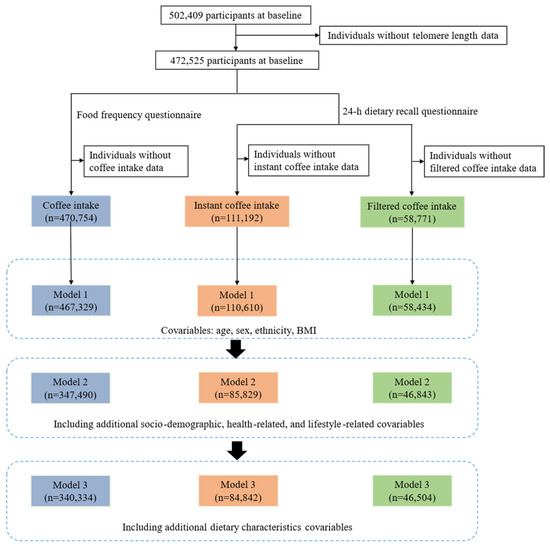4
Telomere length, as a biomarker of accelerated aging, is closely related to many chronic diseases. We aimed to explore the association between coffee consumption and telomere length. Our study included 468,924 participants from the UK Biobank. Multivariate linear models (observational analyses) were conducted to evaluate the associations of coffee intake, instant coffee intake, and filtered coffee intake with telomere length. In addition, we evaluated the causality of these associations in Mendelian randomization (MR) analyses by four methods (inverse-variance weighted (IVW), MR pleiotropy residual sum and outlier (MR-PRESSO), MR-Egger, and weighted median). Observational analyses indicated that coffee intake and instant coffee intake were negatively correlated with telomere length, which was equal to 0.12 year of age-related decrease in telomere length for each additional cup of coffee intake (p < 0.001), and 0.38 year of age-related decrease in telomere length for each additional cup of instant coffee intake (p < 0.001), respectively. There was no significant correlation between filtered coffee and telomere length (p = 0.862). Mendelian randomization analyses supported the results of observational analyses. Coffee intake was found to have a causal effect on telomere length through weighted median analysis (p = 0.022), and instant coffee intake had a causal effect on telomere length through IVW analysis (p = 0.019) and MR-PRESSO analysis (p = 0.028). No causal relationship was found between filtered coffee intake and telomere length (p > 0.05). Coffee intake, particularly instant coffee, was found to have an important role in shortening telomere length.



It seems like filtered coffee did not have a negative relationship in this study.
I wonder why? I am not super familiar with the specifics of instant coffee but gather that’s it is basically very concentrated.
From my reading, you are correct, but their methodology for determining what type of coffee people drank was very limited and the authors know it. While they didn’t see any of the issues they were tracking with normal filtered coffee, they did theorize a reason why instant may be a problem.
From the paper:
Also:
The paper then goes on to list the limitations they know to exist with their own research and suggest that more work be done.